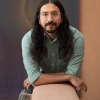The Through Line Connecting the Juvenile Delinquent With the Academic I Am Today
I was flat on my stomach, hands behind my head, face pressed against the sandpaper shingles of a stranger’s roof.
“Now stay there, just like that, or I’ll shoot you,” a man shouted up to me.
There were at least five hours left until sunrise and save for one man holding a large silver pistol, the street was deserted. I was somewhere deep in the suburbs of north Phoenix, and though I couldn’t have been very far from home, I didn’t recognize my surroundings. In the yellow gobs of sodium vapor streetlights, all the beige-brown houses looked the same.
“I’ve called the police,” he shouted, “if you try to run, I’ll shoot you right here. You’re on my property, and I have the right.”
The man’s voice rang clear through the night. Moments earlier, I had been completely absorbed in the adrenaline of trespassing and the concentration required to climb on top of a house. Now that trance was broken, and I was painfully aware of how I looked to the world, dressed in all black, debating whether to risk a gunshot wound or wait for the police.
“Describe your personal, educational, and/or professional experiences that motivate your decision to pursue advanced study in science, technology, engineering or mathematics.”
It’s a deceptively simple question. Standard responses involve waxing poetic about the beauty and usefulness of your field, telling some story that demonstrates how, even from an early age, you were a special little Einstein destined for greatness, and maybe, if you’re a member of an underrepresented group or someone you know was addicted to drugs or you were poor(ish) or no one ever came to your parent-teacher conferences, you can describe how you came up from the ashes to succeed, despite everything.
I know those strategies because I have employed some of them myself. And as I leaned deeper into the rituals of academia, I learned to entertain application readers by subtly subverting the tropes of the personal statement genre. I’ve never lied in my applications for funding, but I’ve also never found an effective way to fully come clean and connect that teenager on the roof with the academic speaking to you today. Why would I bother? If someone actually asked me, our profession cheats itself by holding onto formulaic narratives that launder the strangeness out of an inherently strange vocation.
In the months following my arrest, all kinds of people wanted to know what I was doing on that man’s roof. I had a hard time explaining myself. A huge reason I climbed on that roof is the same reason I shaved my head into a Mohawk and became the skinniest third string lineman on my high school’s football team: I was an angry, thrill-seeking, hormone-crazed adolescent. I liked being out past curfew. I liked feeling like the villain in a children’s story. I liked spray paint. And I chafed at the pervasive attitude that “being smart” is safe and serious—never vulgar, never absurd, never risky.
So one night, while my mother thought I was somewhere I wasn’t, I dared myself to do something new. I picked a house on a whim, climbed atop the backyard fence, hopped on top of a stranger’s home, and marked it with that timeless symbol of unarticulated chutzpah: a penis. A penis! Absurd and childish, long as a school bus and wide as...a house, I sprayed that sucker on. It was offensive, completely beneath me, and it made me laugh.
I’ve mellowed out since then. I’m not proud about damaging that man’s property and frightening him in the middle of the night. But if you really want to understand someone, why they do the things they do, you can’t just watch a well-edited highlight reel. Take it from a now-historian-and-philosopher of science: your reasons for doing science are not incidental to the science you produce. Being curious about the world, wanting to improve the world—these traits so commonly referenced in professional autobiographies aren’t unique to scientists. What’s interesting about you as a scientist is what happened in your life that caused you to elevate curiosity so high that you chose to pursue such a precarious profession.
Whether I care to examine it or not, there is a through line connecting the juvenile delinquent with the academic I am today. We both want to give ourselves away to grandiose projects, climb above it all, and take a God’s eye view. The stories we tell ourselves about ourselves matter, not just because it’s somehow better to be authentic than fake, but because science, this whole intergenerational enterprise of collective inquiry, cannot be defined solely in terms of methods, theories, questions, and explanations. To really understand science, we have to try and understand the people who do science and the ways their dispositions and prejudices inevitably guide their work. Which is why I encourage each of you to rattle your own can of metaphorical spray paint, get real, and write something personal next time you’re faced with a personal statement.
Kelle Dhein is a philosopher, a historian of science and a postdoctoral fellow at the Santa Fe Institute.
Joshua Earle / unsplash





